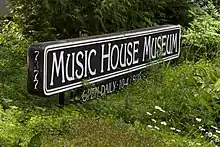Music House Museum
The Music House Museum has a collection of restored antique musical instruments, early radios, and recordings. It is housed in a 1909 dairy barn and a 1905 granary farmhouse, located between the communities of Acme and Williamsburg in Grand Traverse County of Northern Michigan. It was established in 1983 and is a result of a hobby by an architect and a mechanical engineer.
 Music House Museum sign | |
 Location within Michigan | |
| Established | 1983 |
|---|---|
| Location | Northern Michigan |
| Coordinates | 44°47′33″N 85°29′19″W |
| Type | Museum |
| Visitors | 20,000 per year |
| Founder | David Stiffler and Dean Junker |
| Website | Music House Tour |
Background history
David Stiffler, an architect, and Dean Junker, a mechanical engineer, began a hobby of collection, restoration and display of antique musical instruments in the 1970s. At that time they were using the old Stiffler family farm between the communities of Acme and Williamsburg near Traverse City, Michigan. In 1979, they decided to create a formal display for friends and others to see their collection. They formed D and D Enterprises as a venture for the collecting, restoring and displaying of antique musical instruments. They started work to remodel the Stiffler 1909 dairy barn and 1905 granary farmhouse into a presentation area for the musical instruments.[1][2][3]
The first display of historical restored mechanical musical instruments was in the granary farmhouse in mid-1983.[4] Work was then started in remodeling the 12,000 square foot (1,100 m2) white dairy barn in the later part of 1983.[4] It eventually opened to the general public in May 1984 as Music House Museum, a non-profit organization. The original white barn is the main collection of the restored antique musical instruments. The granary is the museum’s main entrance and has old radios. A covered walkway was built in 1981 between the farm’s granary entrance to the barn that holds the collections. They called the granary the old farmhouse, from which the music museum received its "house" name and was where the farm’s workers lived and slept.[1][5]
Current museum
The museum has guided tours and self-guided tours displaying the history and craftsmanship of the instrument collection. It has some twenty thousand tourists per year and has received about a half million visitors from its beginning. The museum has grown over the years and displays musical items from the 1780s to the 1950s.[6] It has early one-of-a-kind restored automated musical instruments, player pianos, music boxes, keyboard instruments, a mechanical violin, antique radios, vinyl phonograph records, and printed music.[7][8]
There are demonstrations from time to time of the restored musical instruments.[9] Examples of the restored instruments in 19th-century nostalgic settings are the organ from Detroit's defunct Cinderella Theatre, a 1924 Wurlitzer theatre organ, and a 97-key Amaryllis Mortier dance organ that is 30 feet (9.1 m) wide and 18 feet (5.5 m) high.[3]
Gallery
_-_Music_House_Museum.jpg.webp)
Amaryllis Mortier
Dance Organ_-_96_pipes%252C_43_notes%252C_5_stops%252C_play_ten_tunes_from_pinned_wooden_barrel_-_Music_House_Museum.jpg.webp)
Frati "Cornettino"
Barrel Organ
Weber piano 
Wurlitzer Hope-Jones
unit orchestra 2
Pipe Organ 
Violano-Virtuoso
self-playing violin & piano
See also
References
- "The Music House Museum". Music House Museum. 2017. Retrieved January 3, 2018.
The former dairy barn now houses the main collections. The granary serves as the Museum’s main entrance.
- Skiba, Walter (August 14, 2004). "One-Tank Trip: Music House Museum". NWI Times. Retrieved January 3, 2018.
The museum property originally consisted of a farmhouse built in 1904 and dairy barn built in 1909. The buildings were connected in 1981 and the Music House opened its doors in 1983.
- "Welcome to the Music House Museum". The Music House Museum. 2017. Retrieved January 3, 2018.
From 1979 to 1982 they worked to refurbish the 1909 barn and the 1905 granary into a turn-of-the century showcase...
- Maloney 2003, p. 512.
- Newkirk, Dana (May 19, 2015). "This barn holds one of the country's largest collection of restored instruments". Destination Strange. Roadtrippers. Retrieved January 3, 2018.
- Jacobs, Susan (March 31, 2015). "Singing the Many Praises of Michigan". Smart Meetings. Retrieved January 3, 2018.
Music House Museum, housed in a charming, 100-year-old dairy barn, showcases a collection of rare instruments and music boxes from the late 18th century to 1950.
- AASLH 2002, p. 392.
- Cantor 2005, p. 56.
- Counts 2011, p. 79.
Sources
- AASLH (2002). Historical Organizations in U. S. Rowman Altamira. ISBN 978-0-7591-0002-2.
- Cantor, George (2005). Explore Michigan. University of Michigan Press. ISBN 0-472-03091-4.
- Counts, Jeff (6 June 2011). Explorer's Guide Michigan. Countryman Press. ISBN 978-1-58157-876-8.
- Maloney, David Jr. (2003). Maloney's Antiques. Krause Publications. ISBN 0-87349-732-5.